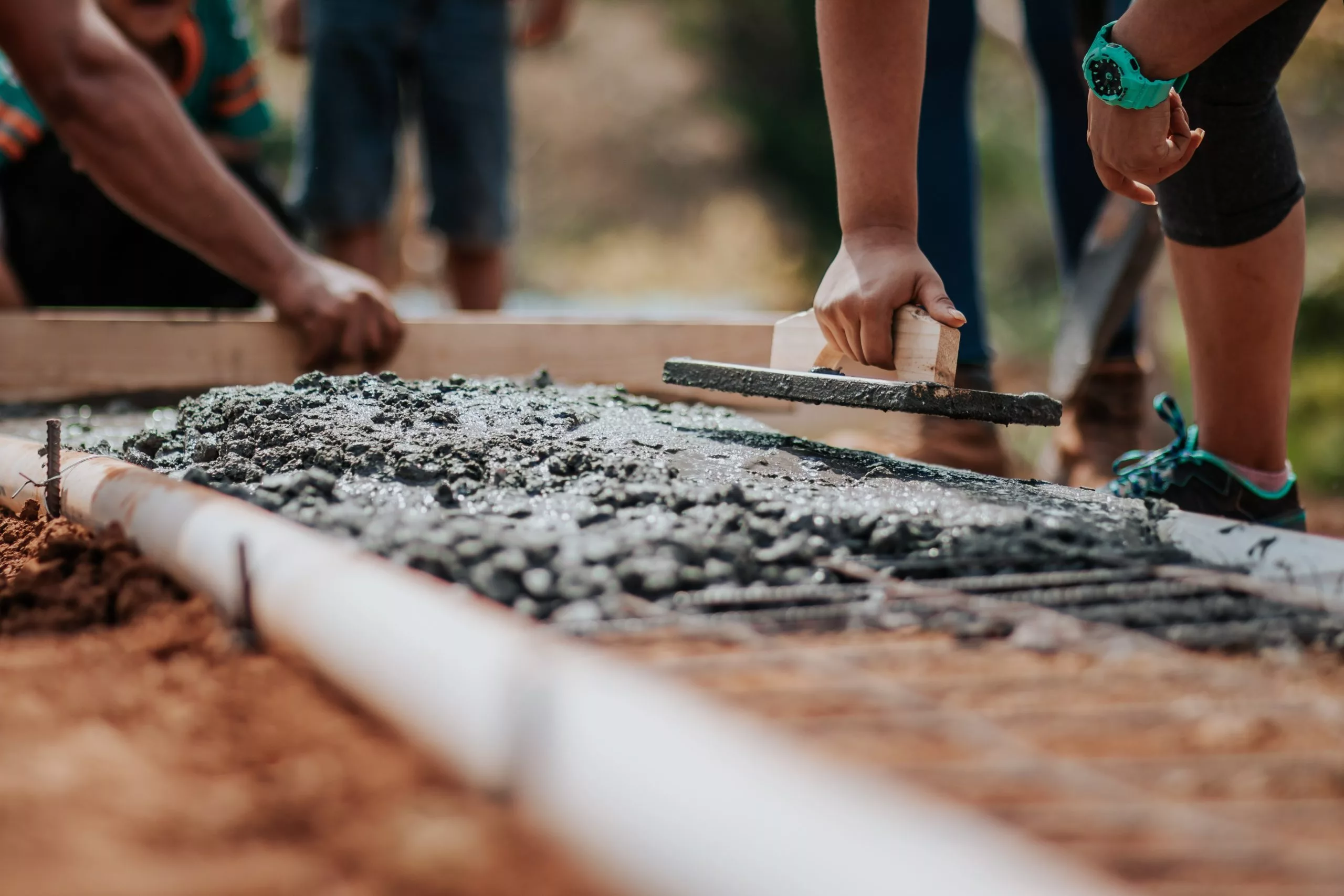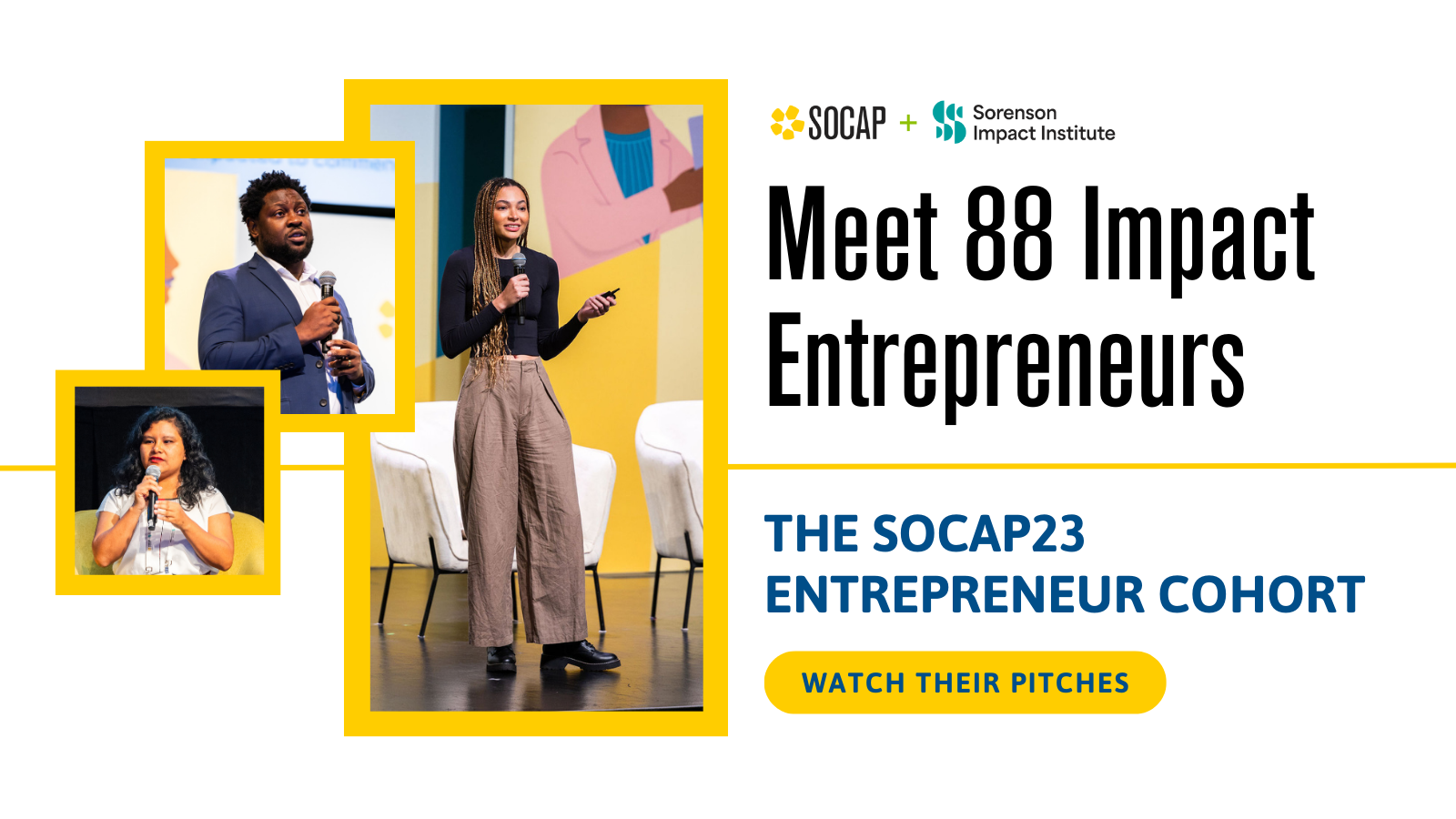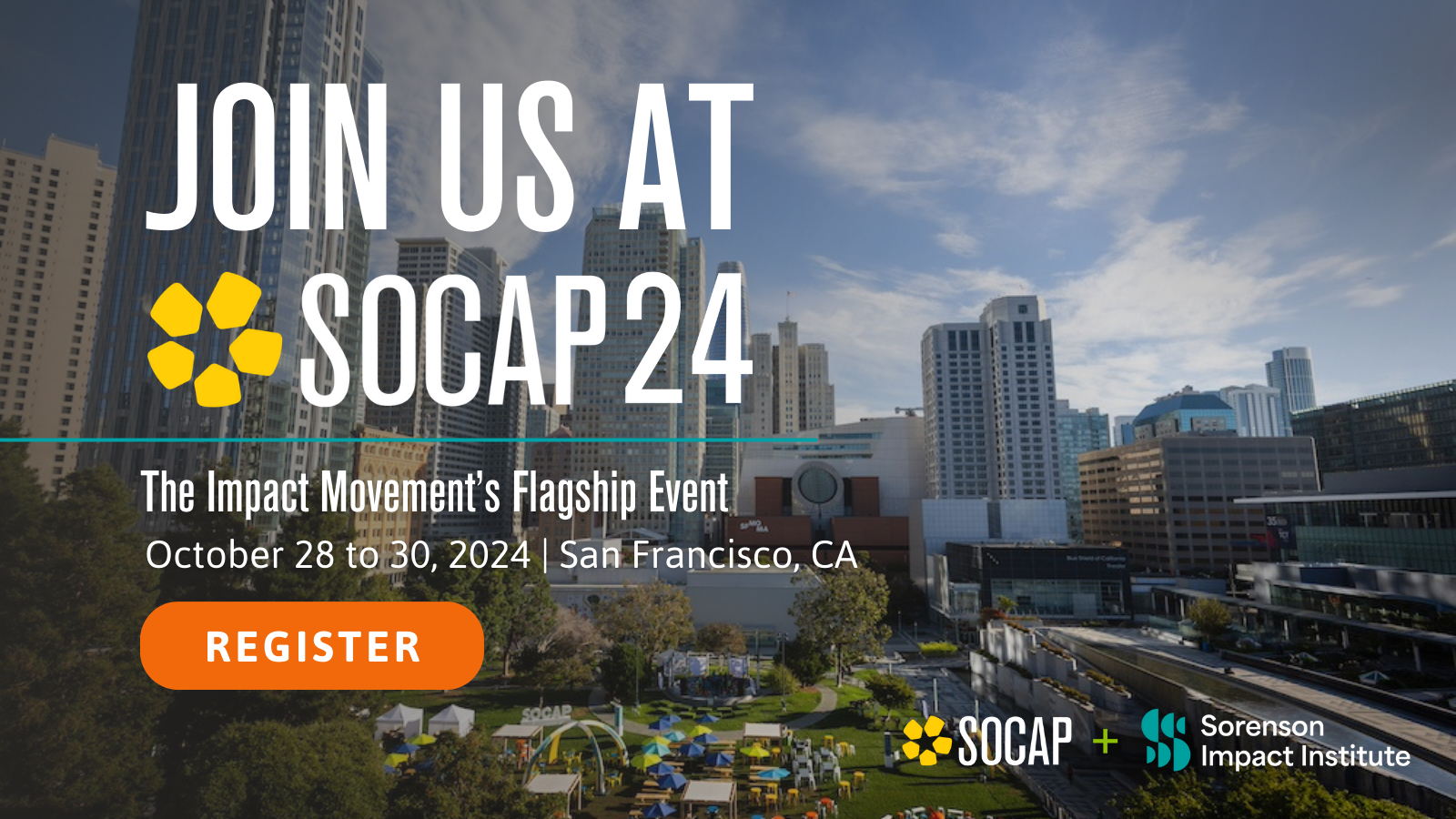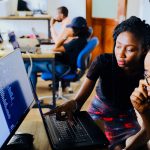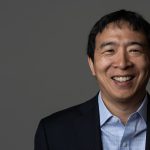Leaders Discuss How to Deploy Capital to Strengthen Marginalized Communities
Modern economic systems do too little to identify and address disparities that affect marginalized communities. Rather than strengthening these communities, companies and those with access to capital often extract value from them and don’t reinvest it to build community resilience.
“We gentrify communities when they become safe as a city, rather than having people actually participate in the safety and wealth-building that happens in their community,” says Christina Hollenback, founding partner of Justice Capital and Nexus Global.
A new generation of leaders, including Hollenback, in the corporate, financial and nonprofit sectors are joining together to create an economy based on shared wealth and prosperity. These leaders recognize and systematically advance solutions for a more equitable, just economy.
In this conversation from SOCAP Virtual 20, we hear from some of the leaders who are developing the capital innovations and the economic strategies to advance a shift to an economic system of Community Capital that allows wealth that is generated to flow back to the people and places from which it’s grown:
- Peter Bratt, The Village at Friendship House
- Christina Hollenback, Founding Partner of Justice Capital & Nexus Global
- Lesliey Welch, Co-Director of the Birth Center Equity Fund
- Eldra Jackson III, Co-Executive Director of Inside Circle
- Taj James, Co-Founder of Full Spectrum Capital Partners, accompanied by co-founders Dr. Stephanie Gripne and Ruben Hernandez
Watch the full session or read the transcript below.
Watch Real Talk at the Kitchen Table: Equitable Development and Just Transition
Taj James: Welcome SOCAP family. My name is Taj, and this year you’ve all been invited to the cookout. We’re going to have a real talk kitchen table conversation about what needs to happen to shift capital, to build the relationships and the power we need to advance the equitable development and just transition that so many communities are trying to move and make happen. It’s just great to be with all of you. I’m with the Full Spectrum Capital Partners, along with co-founders Stephanie Gripne and Ruben Hernandez, and I run a small project within that called Full Spectrum Labs.
You’re going to be meeting a bunch of the folks who we have the pleasure to be in community with and in partnership with as we explore this question of, how we align our financial value with our deepest values to build the kind of change that we all need and need to see.
I want to start by saying the name of two recent ancestors, sister Elandria Williams, part of the Highlander family, one of the giants in the global movement to build a solidarity economy, and brother Cecil Corbin-Mark from WE ACT, one of the giants of the environmental and climate justice movement, who both recently left us too soon. And we know they’re having a cookout right now. I just want to bring them in and appreciate all the ancestors’ whose shoulders we’re standing on in this conversation, including those who left us too soon. If you never got a hug from Cecil, then you missed out because that’s the best hug you’ll ever get. Just gratitude to Cecil and Elandria as we come into this conversation.
About a year ago, Steph, Ruben and I got on a plane from Colorado and Oakland and flew to Memphis because we were there to see a very important person named Anasa Troutman, who was doing some work to reclaim historic Clayborn Temple, which is the site of Martin Luther King’s last campaign, the site of the Sanitation Workers’ Strike, and to bring that community institution back to life as a part of a strategy to transform Black Memphis and to transform the Black Belt South.
Now she’s leading a whole, Southern shift initiative with other Black women around the South to advance restorative and regenerative development. So we want to call Anasa into the room because Memphis is a really important place.
We have Peter Bratt on this call. He is an amazing filmmaker — “Follow Me Home,” “La Mission,” “Delores” the documentary. Peter is also like Anasa, not just an artist and a creative, but a community developer. And Peter’s working on a project with Friendship House in the Village in San Francisco. Peter and Anasa are connected. And the work of Indigenous folks in San Francisco and Black folks in Memphis is connected because Peter and Anasa are connected, and they’re sharing the lessons across those networks.
Christina Hollenback is also here. Christina brought Eldra Jackson III into Peter’s and my life. Eldra is a leader of Inside Circle. They are doing deeply transformative work with folks inside and outside of the system, formerly incarcerated folks, and building a whole new economy around that. Peter and Eldra are trying to figure out how Black folks and Indigenous folks in San Francisco, who are trying to make space, make sure there’s housing, make sure there’s healing, can make sure that that’s available and that can happen. I want to start with you Peter.
Appreciations and gratitude for everything that you’re doing. You’re working on a development project, you need around $60 million to get things moving and going, and there’s a set of relationships and partnerships that are happening to move that. You’re supporting Eldra in efforts to get housing for folks in San Francisco. One of the things that’s really powerful about what you shared is just the way that your community has come together recently in a way that is unprecedented. Can you say a little about the circle that’s going to happen and just what the significance of that circle is in this time for humanity? What does it mean that that’s happening?
Peter Bratt: First of all, thank you for having me, brother, and all the other relatives who are on the panel. My name is Peter Bratt, and I’m from the Quechua people, so when I speak, I represent my family circle and my tribal backgrounds. As a filmmaker, one of the interesting things that I see is this conversation happening right now in the country where — referring to James Baldwin, who said that our origin story, our origin narrative as a country, was deliberately designed to reassure us all that no crimes were committed — I think today that so many people are realizing, well, there was a little bit of crime that was committed in the formation of this country.
And I’m specifically speaking to the conjoined twins of American Indian genocide, Indigenous genocide and land theft, and the enslavement of millions of Africans. I’ve been approached by many, many different white relatives, who are coming in and have reached this point, particularly when brother George Floyd was murdered, like, “Enough is enough. We have to deal with this. We have to confront this painful past. How do I become part of that conversation?”
Within that context, within the American Indian community in San Francisco, so many of our Native non-profits and groups have been pursuing their own individual agenda. We all serve the same people, the same population, but we hit this point recently where we realized we ain’t getting nowhere. We started to combine forces, and we started this long process of building this coalition. We realized that in order to move forward, we have to go back to our original teachings and systems.
Borrowing from our Oglala relatives in South Dakota, we’re using what they call the Buffalo systems of organizing. And that is, if you look at the Buffalo nation, there’s not one leader. And at night, what’s telling is the male bulls, they make the outer circle, and they face the outside. And then within the inner circle are all the female, the calves, and then in the center are the babies, the little calves who are the center of the nation. So everything works to preserve this new, younger generation and everybody works in concert for that purpose. There are values and principles that align with the Buffalo nation teaching.
We started to organize ourselves as a coalition using the Buffalo nation organizing system. We’ve created this coalition, and what we want to do is we want to build the first urban traditional village in the United States. And the reason why this is exciting to so many of us is because the majority of Indian people today live in cities just like San Francisco and Oakland and Los Angeles and Seattle and New York. Yet there’s a disconnect. Indian Health Services is supposed to provide for the general social services of Indian people by way of treaty. But less than 1% of IHS budget goes to serving the urban population. There’s a disconnect, so what we want to do in our village is really a 21st century solution to a 21st century reality, which is that we’re urban, we’re intertribal, we’re often interracial, and we’re still without a physical and cultural home.
So the Village is really this concerted effort to really give our people a new space to kind of come together and have a physical space where we can, not just provide social services, but a place where we can thrive. We’ve been in this survival mode for, I would say, decades if not centuries. We need to move out of that sphere into, what my brother Taj calls, the consciousness of thrive. Our intention is to build just that. And in the last 12 months we made a lot of headway. We just got site control of a lot.
A number of Native nonprofits have banded together and will be the first organizations housed in the Village core. It’s an exciting movement that has really gripped, not just the Indian community, because the word is getting out on the street, “Oh, you guys are building a village.” We’ve also heard from a lot of our African-American relatives in the city saying we want to build sister villages and let’s build these bridges between our peoples that reflect the rich history that we’ve had together already for over 500 years.
Taj James: Our safety and thriving depends on space. Space to be, space to create, space to grow, space to thrive. This question of site control, of land return, of the transfer of access — to space, to land, to buildings for the regenerative, productive economic activity that our communities need to drive — it’s so foundational. Literally the ground and the soil, foundational to all other forms of capital. The work that you’re doing, the work that Anasa is doing, the work that Eldra and Inside Circle are doing to just sort of establish space, in my sense, is some of the most important work that we have to do as capital students. Space to grow, space to create, space to heal. As you were talking about, the wisdom practice that you were organizing, that had the little ones in the center.
Of course, I started thinking about my sister here, Leseliey, who is a giant in the world of maternal health and the leader of the Birth Center Equity Fund’s VC Capital and Birth Detroit. As someone who’s building a birth center, a university professor, working with other birth center leaders and maternal health leaders around the country, you’re figuring out how to make sure that our communities have access to safe and healthy births and that the children are cared from before they enter the world.
What does the birth center community need? You and Christina are engaged in some parallel work, which is, you’re not just trying to help individual birth centers, but you’re trying to build a whole new birth center economy. Christina is working to build a whole new decarceration economy. You’re not just financing individual projects; you’re financing multiple projects and infrastructure. You have a whole economic strategy that you’re building at the same time that you’re building a birth center. That’s a lot of hats to wear. How can we help? What do you need?
Leseliey Welch: We’re launching a campaign that says we need $100 million. We have identified $50 million of immediate need for the birth centers in our current network. And then there are more and more leaders out there who are reaching out every day saying, “I’m out here trying to build a community birth center.” I think that what resonates so much is that origin story — helping people understand that how and where we’re born means so much to our opportunities for health and wellness in life. This time in our country’s history, the results of this, the impact of this will live on for generations to come because we hold the past and the present and the future in our wombs and our bodies. We need space for Black, Indigenous and People of Color to have our babies and to grow our families where we know we are getting the best quality care in a safe environment and where we can be whole.
What we know right now is that we don’t have that and that the majority of communities of color across this country do not have access to birth center care — care led by midwives, care that we know makes a huge difference in our health and our safety in our experience of birth, in the economics of birth. And it can make a life or death difference for folks of color to be cared for in spaces that honor our culture. We want that for our families today and for generations to come. We don’t just want to rent our spaces; we want to own our spaces. We want our communities to own our spaces so that there’s no possibility that they could immediately be taken away because we need them.
Taj James: Leseliey can you tell folks a little bit about Mama Jenny, who she is in your life and how you’re supporting her?
Leseliey Welch: Jenny Joseph, we call her affectionately Mama Jenny, is a renowned midwife. She’s been practicing midwifery for over 30 years. In Florida, she has a birth center, easy access clinic, and the very first accredited midwifery school to be owned and led by a Black woman in this country. She is a mentor and inspiration and exemplar to so many of us who are starting easy access clinics or opening birth centers in our community. And to be clear, there’s not a ton of us. Our network right now is about 25 and growing. But Mama Jenny has had a hand and an impact on so many. What we’re trying to do with her in the network is to support her in a way that she supported all of us by helping her to grow what she’s building – helping her to grow her easy access clinics, her telehealth ventures, and to solidify the sustainability of her important work.
Taj James: Thank you, Leseliey. It’s amazing to see you provide support to someone who’s supported you in so many ways with grants, with equity, with acceleration support, with venture capital as you’re building your own birth center. It’s just been remarkable to see you take all that on in the way that you are. It’s been beautiful.
Brother Eldra is here at the cookout. I have to tell you all that when Christina introduced me to brother Eldra and he shared some of his story, my life was forever changed. If you get a chance to spend some time with Eldra, hear him speak, you’ll know why because he loves us. He really does. He sits with those who have experienced the deepest and most profound suffering and, in that space, creates healing, creates the possibility for healing, just in who he is.
He is working with other folks who’ve been impacted by our criminal legal system. Who’ve been harmed by it to heal inside and out and to build a whole new economy that’s not based on fear and violence and incarceration but based on care. Based on care and community sovereignty in working in the communities all around the country. I’m just excited for you all to be meeting each other because we’ve been talking about where we’re building some of this housing for folks who are coming out, coming home. Maybe we put that right next to the birth center. Right next to the Village. The kinds of development that you all are doing is so holistic and integrative that there’s just natural connections between the folks who are deploying capital in healing ways.
I just want to invite you and Christina to share a little bit about what you’re dreaming, what you’re creating, what you’re hoping for and what you need. Because working with Christina, this is one of the projects where there’s all kinds of opportunity for participation in this on the capital side at a significant scale. We’re talking about some very large scale systems that we are shrinking in order to grow some other systems. Christina, Eldra, what do you need?
Christina Hollenback: Eldra, you want to take that one and I’ll just follow on?
Eldra Jackson III: Sure. I’m in Sonoma, California, right now, and I’m actually doing a bit of work trying to nip the problem in the bud with the schools to prison pipeline. We were at Archbishop Hannan High School. It is a high school for young men who have been kicked out of public schools. We just spent the morning and half of this afternoon with those young men trying to set the stage to begin creating a space for them to take ownership over their lives and developing new ideas about themselves and what’s possible. That’s kind of what I’m passionate about. Having spent so much time in prison myself, I’m trying to reach some of these individuals before they wind up in prison.
Inside Circle was born in New Folsom Prison in 1996, following a massive race riot. A man named Patrick Nolan, who was a member of the Aryan brotherhood, went around after that riot and got some of the leaders of different gangs on the yard to come together or allow their people to come together and sit down in a space that turned into these healing circles that we hold.
And out of those healing circles, we learned how to love self. And when I learned how to love myself, that put me in a position to be able to learn how to have the capacity to love other people. It’s very difficult for me to want to see harm come to you when I can identify with you, when I can see the light in you, when I can recognize myself in you. And at heart, that’s all I want to do is create spaces in the world where people can learn how to love themselves. They can recognize the value in self, recognize the value in others and begin to have a life of purpose that comes from that place. That’s really all I want to do.
Taj James: Thank you, brother. Christina, anything you want to share about the ways that we’re supporting Eldra to take all of the genius and solutions that they’ve developed and make sure that everybody who needs access to healing has access to healing, everybody who needs access to housing has access to housing. Because the thing I’ll tell you about sister Christina is she’s got a plan, and it’s a big plan, and it’s working. Tell us a little bit, Christina.
Christina Hollenback: Yeah, I appreciate that. Folks like Eldra, they exist all over our country. I appreciate Eldra and the work he’s doing today because that’s where my best friend got sent when we were 12. And the paths of our lives were set by the criminal justice system in so many ways. Sent to these alternative schools and the school to prison pipeline, the cradle to prison pipeline. There’s absolutely an alternative continuum that exists because Black, Brown, systems-impacted communities like the ones I grew up in were resilient.
Over the last really 25, 30 years as mass incarceration has been happening, there’s also another movement that’s been happening and continued in our own communities with programs like Eldra’s Inside Circle, credible messenger programs, folks that have been through the system that now are acting as community public safety alternatives. But we don’t resource them. We don’t resource them. And yet they are absolutely embedded and creating value in our community that then developers extract that value.
They take that value from those communities. We gentrify communities when they become safe as a city, rather than having people actually participate in the safety and wealth building that happens in their community. And so at Justice Capital, we work with programs like Inside Circle and credible messenger programs around the country to be able to not just scale — and I mean scale like take on the roles of the system, so that the system is no longer existing as it currently does — but it exists in our lights, in our reflection, in our ways. To be able to actually see alternatives to policing, alternatives to cash bail, alternatives to prisons, alternatives to re-entry, but also begin to repair the harm that’s been done by extracting so much from our communities for so long.
So that means birth centers, absolutely, that means community villages, that means all of it because we have to actually repair the harm that’s been done. That means expanding housing, safe, affordable housing and transformational housing that actually helps people deal with the trauma that has happened in their lives, so we’re actually breaking those cycles. It also means expanding ownership opportunities for People of Color and formerly incarcerated people. It includes expanding public health and safety programs so that we don’t have to re-exist in the same way.
Taj James: Thanks, Christina. Thank you all for coming to the kitchen table cookout here. We could spend the whole day talking about this. I think for Steph, Ruben and I at full spectrum, it’s just an honor to be in partnership and in collaboration with all of you. I think that we’re in a moment in which, as we all know, we’ve got to shift hundreds of millions in philanthropic capital to unlock billions in debt to access trillions in public finance. Because just on the Green New Deal or Biden’s climate plan, there’s $2 or $3 trillion that are going to be coming into community. And the work that you all are doing is going to ensure the capacity exists in those communities to benefit from that public investment in a way that never happens.
Our communities missed the 2008 stimulus. We missed the 2020 stimulus because the investment hasn’t been made in our capacity to steward our own capital. We’ve got to divest, we’ve got to return the land, return the capital, give the land back, just give it back. We’ve got to shift capital from wall street to main street. And we’ve got to reinvest. But within this community, there is clarity about how we need to fundamentally transform and shift, not just the worst of the capital and not just the best, but the full spectrum. All of it has to shift. All has to be repurposed and infused with values that serve our thriving, that serve people and the planet.
